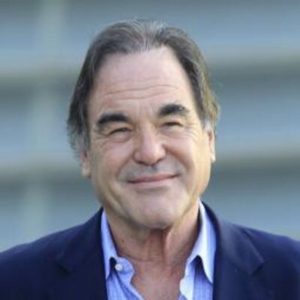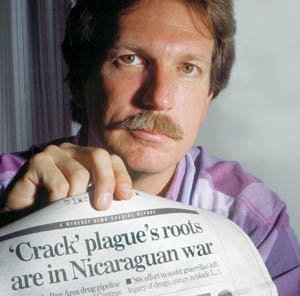Oliver Stone Honored with Press Freedom Award
MEDIA, 8 May 2017
Robert Parry – Consortium News
Director Oliver Stone – in recognition of his brave work in documentary films – has been selected as the winner of the 2016 Gary Webb Freedom of the Press Award.
4 May 2017 – Though most people know Oliver Stone as a famous screenwriter and movie director, he has also lent his talents and resources to a number of documentary films that embrace the core journalistic idea that there are usually two sides – if not more – to a story.
In doing so, Stone has taken on controversial subjects, both in challenging conventional history as with Showtime’s “Untold History of the United States” and daring to treat foreign leaders – who were undergoing demonization by the U.S. government and media – as complex figures who deserve to have their say as well.
Not surprisingly, Stone has faced intense criticism for deviating from mainstream U.S. groupthinks, which seek to portray international adversaries as cardboard villains deserving only of American hatred and bombs.
But Stone learned as a decorated young soldier in the Vietnam War how that propaganda process can lead to unspeakable horrors, including the unnecessary deaths of millions of people and the devastation of entire nations and regions.
The Vietnam War – and the U.S. government’s lies that justified it – taught Stone a powerful lesson that is as true now as it was then, that a healthy democracy should encourage a diversity of viewpoints, appreciate all sides of a conflict, and have the courage to engage in serious self-criticism, not simply assume that what the authorities are saying is true.
Stone’s documentaries have included close-up studies of Latin American leftist leaders challenging U.S. hegemony in the hemisphere, including Cuba’s Fidel and Raul Castro, Venezuela’s Hugo Chavez, Bolivia’s Evo Morales, Ecuador’s Rafael Correa, the Kirschners of Argentina, Brazil’s Lula da Silva and Paraguay’s Fernando Lugo.
Stone recently produced a documentary on the Ukraine crisis, entitled “Ukraine on Fire,” which offered a nuanced understanding of Ukraine’s modern history as well as explaining the behind-the-scenes story of the violent overthrow of elected President Viktor Yanukovych and the secret U.S. hand in turning Ukraine into a flashpoint for a new Cold War.
In June, Showtime is scheduled to release Stone’s series of interviews with Russian President Vladimir Putin, spanning two years, entitled “The Putin Interviews.”
Because of his courage and tenacity in presenting sides of important stories that many powerful interests in the United States would prefer the American people not hear, the Board of Directors for the Consortium for Independent Journalism (which publishes Consortiumnews.com) presents Oliver Stone with the Gary Webb Freedom of the Press Award for 2016.
Background of Award
The award is named in honor of investigative reporter Gary Webb who in 1996 courageously revived interest in one of the darkest scandals of the 1980s, the Reagan administration’s tolerance of cocaine trafficking by the CIA-organized Nicaraguan Contra rebels who were fighting to overthrow Nicaragua’s leftist Sandinista government.
The Contra-Cocaine scandal was originally exposed by Associated Press reporters Robert Parry and Brian Barger in 1985, but the major U.S. newspapers accepted the Reagan administration’s denials and treated the story as a “conspiracy theory.”
So, when Webb revived the story in 1996 for the San Jose Mercury News and described how some of the Contra cocaine fueled the spread of crack across urban America, the major newspapers again rallied to the defense of the Contras and the Reagan administration’s legacy.
The assault on Webb was led by The New York Times, The Washington Post and the Los Angeles Times – and was so ferocious that Webb’s editors at the Mercury News sacrificed him to protect their own careers. Webb found himself cast out from the profession that he loved.
It didn’t even matter that an internal CIA investigation by Inspector General Frederick Hitz confirmed, in 1998, that the CIA was aware of the Contra cocaine trafficking but had put its goal of ousting the Sandinistas ahead of any responsibility to expose the Contra criminality.
Because of the false impression that Webb had manufactured a fake story, he remained unemployable in mainstream journalism. In 2004, with his life in tatters and his financial resources spent, Webb took his own life, a tragic casualty in the difficult fight for a truly free press in America, a press that doesn’t just rubber stamp government propaganda and accept official lies as truth.
[For more on that history, see “The Sordid Contra-Cocaine Saga.”]
______________________________________
 Investigative Reporter Robert Parry broke many of the Iran-Contra stories in the 1980s for the Associated Press and Newsweek. His book, Neck Deep: The Disastrous Presidency of George W. Bush, was written with two of his sons, Sam and Nat. His two previous books are Secrecy & Privilege: The Rise of the Bush Dynasty from Watergate to Iraq and Lost History: Contras, Cocaine, the Press & ‘Project Truth’. You can buy his latest book, America’s Stolen Narrative, either in print here or as an e-book (from Amazon and barnesandnoble.com).
Investigative Reporter Robert Parry broke many of the Iran-Contra stories in the 1980s for the Associated Press and Newsweek. His book, Neck Deep: The Disastrous Presidency of George W. Bush, was written with two of his sons, Sam and Nat. His two previous books are Secrecy & Privilege: The Rise of the Bush Dynasty from Watergate to Iraq and Lost History: Contras, Cocaine, the Press & ‘Project Truth’. You can buy his latest book, America’s Stolen Narrative, either in print here or as an e-book (from Amazon and barnesandnoble.com).
William Oliver Stone (born Sep 15, 1946) is an American screenwriter, film director, and producer. Stone won an Academy Award for Best Adapted Screenplay as writer of Midnight Express (1978). He also wrote the acclaimed gangster movie Scarface (1983). As a director, Stone achieved prominence as director/writer of the war drama Platoon (1986), for which Stone won the Academy Award for Best Director; the film was awarded Best Picture. Platoon was the first in a trilogy of films based on the Vietnam War, in which Stone served as an infantry soldier. He continued the series with Born on the Fourth of July (1989)—for which Stone won his second Best Director Oscar—and Heaven & Earth (1993). Stone’s other notable works include the Salvadoran Civil War-based drama Salvador (1986); the financial drama Wall Street (1987) and its 2010 sequel Money Never Sleeps; the Jim Morrison biopic The Doors (1991); and a trilogy of films based on the American Presidency—JFK (1991), Nixon (1995) and W. (2008). His latest film is Snowden (2016). (Wikipedia)
Go to Original – consortiumnews.com
DISCLAIMER: The statements, views and opinions expressed in pieces republished here are solely those of the authors and do not necessarily represent those of TMS. In accordance with title 17 U.S.C. section 107, this material is distributed without profit to those who have expressed a prior interest in receiving the included information for research and educational purposes. TMS has no affiliation whatsoever with the originator of this article nor is TMS endorsed or sponsored by the originator. “GO TO ORIGINAL” links are provided as a convenience to our readers and allow for verification of authenticity. However, as originating pages are often updated by their originating host sites, the versions posted may not match the versions our readers view when clicking the “GO TO ORIGINAL” links. This site contains copyrighted material the use of which has not always been specifically authorized by the copyright owner. We are making such material available in our efforts to advance understanding of environmental, political, human rights, economic, democracy, scientific, and social justice issues, etc. We believe this constitutes a ‘fair use’ of any such copyrighted material as provided for in section 107 of the US Copyright Law. In accordance with Title 17 U.S.C. Section 107, the material on this site is distributed without profit to those who have expressed a prior interest in receiving the included information for research and educational purposes. For more information go to: http://www.law.cornell.edu/uscode/17/107.shtml. If you wish to use copyrighted material from this site for purposes of your own that go beyond ‘fair use’, you must obtain permission from the copyright owner.

